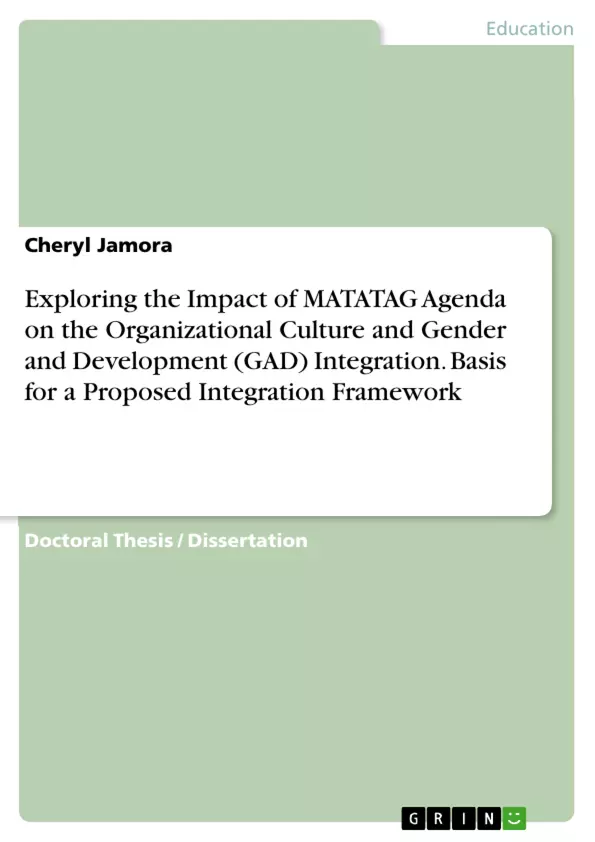This study focuses on the impact of the MATATAG Agenda on organizational culture and gender development integration. The researcher utilizes narrative inquiry to make sense of the respondents' experiences and how navigating these paved the way in shaping transformative outcomes. Utilizing purposive sampling in identifying the six school heads and GAD focal persons from the six districts of the Schools Division of Manila as research respondents, the researcher gathered detailed narratives through a questionnaire and in-depth interviews to identify patterns and themes to build a broader understanding of the event. Subsequently, a framework plan derived from the feedback of the respondents is developed.
Table of Contents
- Chapter 1: Introduction
- Background of the Study
- Statement of the Problem
- Objectives of the Study
- Scope and Delimitations
- Significance of the Study
- Conceptual Framework
- Definition of Terms
- Chapter 2: Review of Related Literature and Studies
- The Matatag Agenda
- Organizational Culture
- Gender and Development (GAD)
- Integration Framework
- Chapter 3: Research Methodology
- Research Design
- Participants of the Study
- Data Gathering Instruments
- Data Analysis Procedures
- Chapter 4: Presentation, Analysis, and Interpretation of Data
- Demographic Profile of the Respondents
- Impact of the Matatag Agenda on Organizational Culture
- Impact of the Matatag Agenda on GAD Integration
- Chapter 5: Summary, Conclusions, and Recommendations
Objectives and Key Themes
This dissertation examines the impact of the Matatag Agenda on organizational culture and Gender & Development (GAD) integration in educational institutions. The study seeks to understand how the agenda influences the organizational culture and the implementation of GAD initiatives. The research aims to develop an integration framework that can guide the effective implementation of the Matatag Agenda within educational contexts.
- The impact of the Matatag Agenda on organizational culture
- The impact of the Matatag Agenda on GAD integration
- The development of an integration framework for the effective implementation of the Matatag Agenda
- The challenges and opportunities presented by the Matatag Agenda in relation to organizational culture and GAD integration
- The potential implications of the Matatag Agenda for educational institutions and the broader education system
Chapter Summaries
- Chapter 1: Introduction This chapter provides an overview of the study, including the background, statement of the problem, objectives, scope and limitations, significance, conceptual framework, and definition of terms. It lays the foundation for the subsequent chapters by establishing the context and purpose of the research.
- Chapter 2: Review of Related Literature and Studies This chapter reviews existing literature and studies related to the Matatag Agenda, organizational culture, GAD integration, and integration frameworks. It provides a theoretical framework for understanding the concepts and their interrelationships.
- Chapter 3: Research Methodology This chapter describes the research design, participants of the study, data gathering instruments, and data analysis procedures. It outlines the methods used to collect and analyze the data for the study.
- Chapter 4: Presentation, Analysis, and Interpretation of Data This chapter presents the results of the data analysis, providing insights into the impact of the Matatag Agenda on organizational culture and GAD integration. It interprets the findings and explores their implications for the study.
Keywords
The dissertation focuses on the Matatag Agenda, organizational culture, Gender & Development (GAD) integration, integration framework, educational institutions, and the Philippines. The study utilizes a mixed-methods approach to explore the impact of the Matatag Agenda on organizational culture and GAD integration, aiming to develop an effective integration framework for educational contexts.
- Quote paper
- Cheryl Jamora (Author), 2024, Exploring the Impact of MATATAG Agenda on the Organizational Culture and Gender and Development (GAD) Integration. Basis for a Proposed Integration Framework, Munich, GRIN Verlag, https://www.grin.com/document/1486714



